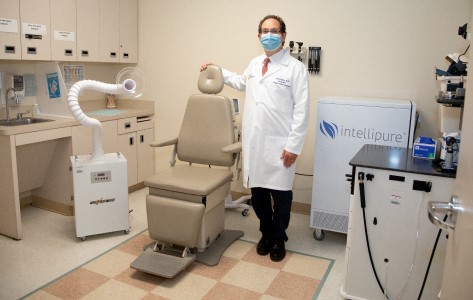
As health care providers throughout New Jersey passed the height of the COVID-19 pandemic and sought to resume care, they were faced with the task of finding new ways of doing so while protecting patients and their own team members.
For otolaryngologists, better known as ear, nose and throat specialists, or ENTs, this was a bit more challenging. These are physicians whose very work means directly working in people’s mouths, throats, noses and ears.
“The pathways of the body we work in are the primary places a virus can pass into and out of,” said Erik Cohen, MD, of Atlantic Medical Group’s Atlantic Head and Neck Surgery. “These are the areas that in many other medical settings can be covered up with masks or other shields. In our line of work, that’s pretty hard to do.”
“Impossible,” however, was not in the vocabulary of Cohen and his colleagues. They quickly formed an interdisciplinary work group that included otolaryngologists throughout Atlantic Medical Group and Atlantic Health System’s medical centers, as well as the organization’s experts in infection prevention, clinical engineering, PPE (personal protective equipment), quality, clinical services and practice operations.
The group first met in mid-May to create a framework to safely resume common trans-nasal and trans-oral procedures.
“There is no roadmap for this kind of work. It’s unexplored territory” said O. Scott Lauter, MD, chief medical officer for Atlantic Medical Group. “The fact that they were able to create a framework for how to resume these procedures in a way that protects patients and team members in such a short window is incredible.”
At the core of the framework is a unique, step-by-step approach to delivering care that allows the team to ramp-up or scale back the appropriate precautions, based on the level of COVID-19 spread in the community. In other words, if there is a spike in cases, they can respond in real-time, easily adding new safety precautions for additional security.
In addition to enhanced screening of patients for COVID-19 before office procedures, enhanced room cleaning and proper PPE for staff, key to the framework was the use of specialized devices:
- VENT Masks™ are face masks with a small port that allows doctors to safely access the nasal cavity, while preventing respiratory droplets from escaping into the air, either from the procedure, breathing, coughing or sneezing
- A specially-designed fume extractor, which features a suction hood on an adjustable arm, positioned near the patient to capture any aerosols or droplets that may escape
- Air purifiers were used after procedures for amounts of time specified by the CDC to remove any aerosols or droplets before any staff or other patients enter the room
The first of the group’s ENT physicians began performing procedures using the framework on July 16.
“This was only possible through commitment to a shared goal and teamwork – truly an example of moving forward together,” Dr. Cohen said. “The end result is creating an environment in which patients and staff can feel truly safe.”